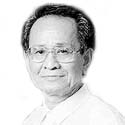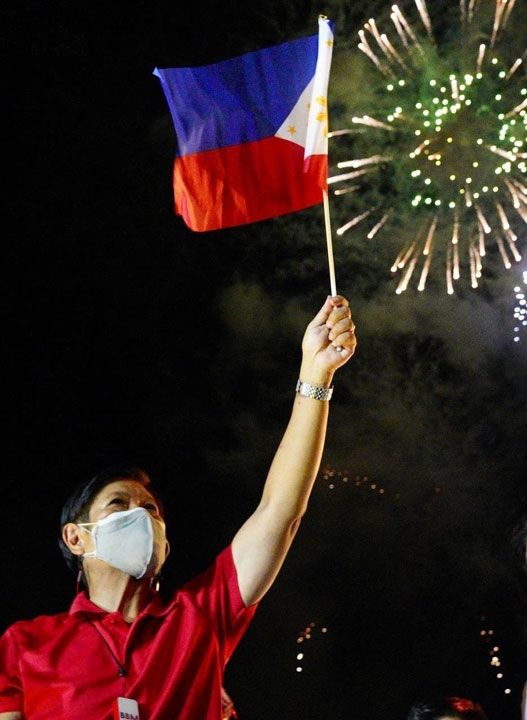
Vantage Point
By Luis V. Teodoro

The energies of the incoming Marcos II regime are better spent on addressing the many problems it is inheriting from its predecessor rather than on “clarifying” what the Marcos Senior martial law regime was all about.
Because remembering the past can prevent its repetition, since “People Power” overthrew it in 1986, human rights groups and martial law victims and survivors have been recalling what characterized that regime. They have been reminding the forgetful of its human rights costs, its impact on the economy and on Philippine culture and society, and overall, its derailment of the democratization process that began more than a century ago.
Through Senator Imee Marcos and her brother, now President-elect Ferdinand Marcos, Jr., the Marcos family has condemned it as a preoccupation with the past, and has urged everyone to “move on.”
During his campaign for the Presidency, Marcos Junior thus refused to participate in the debates and discussions in which he would have had to answer any question related to his father’s 14-year rule. So did his senator sister wave aside any attempt to look into that period.
But it seems that they and their family have been more obsessed with the past than those who fear its repetition. Not only was that obsession evident in Marcos’ campaign slogans and promises, such as his appropriation of his father’s 1969 “this nation can be great again” cry, his promise to revive the “Kadiwa” stores, and his plan to activate the Bataan Nuclear Power Plant, among others.
It was equally obvious in his sister’s remarks about the past, both before and during her brother’s proclamation as this country’s 17th President. She was apparently unaware that among other implications, Marcos Junior’s election itself suggests that the voters who made him President by a landslide either have skewed memories of, or never knew anything about, the martial law period.
When it seemed certain that Marcos Junior had won last May 9th’s Presidential elections, Imee Marcos thanked the electorate for giving her family a “second chance” at getting the country’s highest elective post.
She thus implied that they, particularly her brother, would and could do better this time than when they were last in residence in Malacañang Palace. Their “second chance” provides them the opportunity to avoid committing the mistakes of the past.
Interviewed by the media after her brother’s proclamation, she followed up those remarks by saying that the family had been “oppressed” and “mocked” for years since 1986 and that now she hopes they can “clarify” what their late patriarch’s rule was really like.
Never mind the fact that thanks to their billions, they have not exactly been living in poverty since their return to this country in 1990 from exile in Hawaii, USA. Neither have they been oppressed or mocked by the steady rise in their influence and power over the last 30 years. In addition, despite their then 87-year-old matriarch’s conviction in 2017 on seven counts of graft, and Marcos Junior’s alleged non-payment of income taxes from 1982 to 1985, neither has seen the inside of any prison cell.
Not that these don’t matter; they do. But nothing, it seems, can be done about either in these isles of elite privilege, unaccountable power and impunity— unless, however, the Marcos II administration itself does something about it.
“Do something about it” should be the incoming administration’s mantra, if, as Imee Marcos implied, having been given a “second chance,” it indeed intends to do a better job at governance than the first Marcos regime.
The Marcoses can always argue that the family matriarch, Imelda Marcos, is now 92 and that humaneness demands her exemption from imprisonment. So can they say that despite his income tax issues, the courts did not sentence Marcos Junior to any jail time.
But as forgiving of itself as the incoming administration would be, it should be less tolerant of those wrongdoers in both the public and private sectors who have escaped punishment, among them the crooks in the most corruption-ridden government agencies and the human rights violators in the police and military responsible for the abductions, arbitrary arrests and extrajudicial killings that plague the country.
The Marcos II regime could dispel fears that it is leery of free expression and press freedom by welcoming media engagement in government affairs as a democratic imperative; initiating through its allies in Congress the decriminalization of libel; and putting a stop to the red-tagging and other forms of harassment of journalists and activist groups. It would thereby affirm the value of criticism and media independence in exposing corruption and the improvement of governance, and encourage the free discussion needed in forging the sound political, economic, and social policies that can lift the suffering millions out of poverty.
In foreign affairs, it could maintain and strengthen relations with other countries on the basis of mutual respect without compromising Philippine sovereignty and surrendering the country’s territorial waters to foreign intruders. Defending the rights of Filipino fisherfolk in the country’s Exclusive Economic Zone, among other concrete steps, would send them that message.
It could also review some of its initial choices for certain Cabinet posts by re-evaluating their qualifications, track records, and levels of competence as it did in the case of its economic team. The appointments of department secretaries are mostly political, but they can also be based on merit.
Its officials, from the President down, could make it a habit to listen to suggestions and differing points of view without resorting to profanities, misogyny, threats, or hate speech.
To put it plainly, the incoming administration has to review the methods and even some of the policies and political culture of the outgoing regime of Marcos Junior’s reluctant and tentative ally — who, lest we forget, once described him as “a weak leader” and even implied that he was on drugs.
The Duterte regime has so bloated the country’s indebtedness and driven an unprecedented four million-plus workers into the ranks of the unemployed as to make national recovery from the COVID-19 pandemic extremely problematic for any administration. A comprehensive public health reform and economic recovery program, not just reducing the costs of food and electricity, is thus urgently needed and should be among the new regime’s first priorities.
These initiatives would send to the entire country the message that unlike its predecessor, it will respect human rights and adhere to the rule of law as vital conditions for the country’s recovery and progress, while at the same time restoring some civility and reason in political and public discourse.
Not only would such policies help meet the expectations of good government and better lives among the 31 million who voted for Marcos Junior, it could also convince those who thought his election to the Presidency a catastrophe that, having been given a second chance, the Marcoses could themselves move on, and that rather than being hobbled by such concerns as “correcting” “misimpressions” about their late patriarch’s rule, what they’re focused on is enabling this country to move forward.
Such a demonstration of commitment to good governance and respect for the entire citizenry’s rights and welfare would make any attempt to change the established truths about the Marcos Senior martial law regime — already futile to begin with because of the mountain of documents and testimony attesting to them — totally unnecessary. Both the Marcoses and the rest of the country could then move on in the hope and anticipation of better times ahead.
Luis V. Teodoro is on Facebook and Twitter (@luisteodoro).